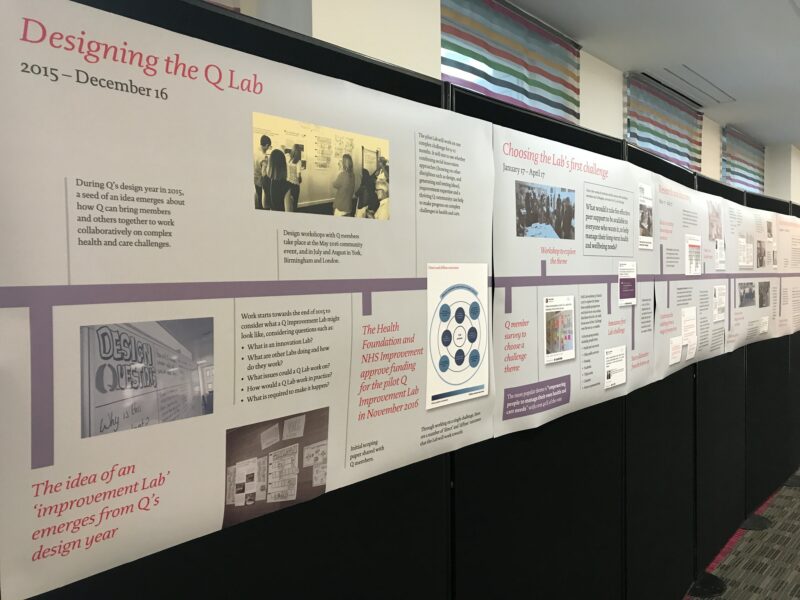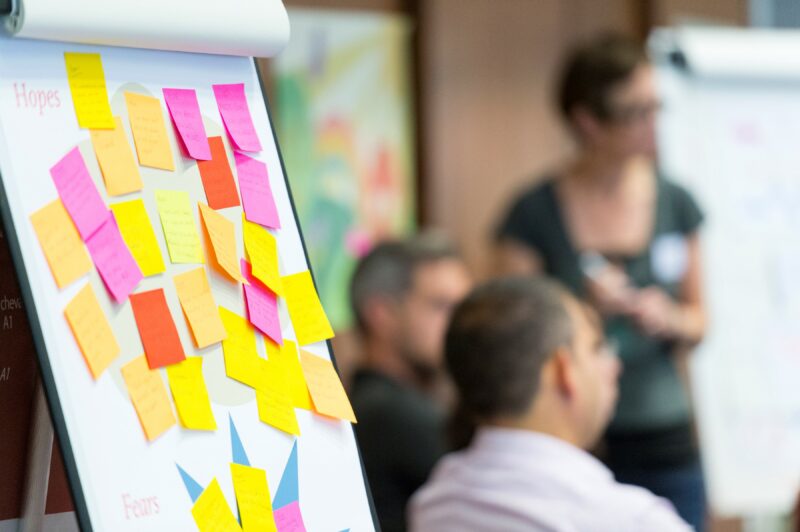As many Q members will know, the Q Improvement Lab (Q Lab) was set up to make progress on complex challenges in health and care.
Working on a single challenge for a year, the Lab draws on disciplines such as design and behavioural science, and brings together Q members and others to draw on their collective expertise and experience. Through this process the Lab aims to develop new insights and ideas on a topic, as well as creating the conditions for professional collaborations and skills to flourish.
The Q Lab started working on the peer support challenge in April 2017. The 12-month project was designed as three broad phases of work:
- Phase 1: Research and Discovery (April – July) – gaining an in-depth understanding of the challenges and opportunities within peer support; building on what is known and from multiple perspectives.
- Phase 2: Developing and testing ideas (August – December). As a result of the insights in phase 1, focusing on a small number of areas to progress (improving the routine offering and promotion of peer support and better generating sources of evidence that capture the holistic impact that peer support can have). We also continued to support the group of people working with the Lab to both better share what does and doesn’t work in peer support and develop their peer support ideas and projects locally.
- Phase 3: Distilling and sharing the learning (January – April). The final phase of the Lab will focus on drawing together the areas of work in phase 2, collating what we have learned about peer support and how the new insights can be practically applied in health and care.

The Lab is now in phase 3 but what does this mean exactly and what will it involve?
The aim of the Lab is to work on a challenge for a fixed period of time, working at depth but also at pace. Drawing on evidence, research and lived experience we have developed a rich understanding of the challenge to generate ideas, develop resources and – over the next couple of months – recommendations to take this work forward.
In our final phase we will be working with those who have been involved in the Lab over the past 9 months, and some new stakeholders in the field of peer support, to support ongoing action and impact. This will range from sharing the Lab’s learning in creative and accessible ways, finding a ‘home’ for the findings so they can be used in the future, to supporting individuals and organisations to take forward ideas and action.
Some specific strands of work include:
- analysing the 2666 responses to our survey on decision making in peer support and working with Lab participants to understand how the new insights can be used in practice.
- continuing to collaborate with National Voices and Mind to take forward an online hub which will pull together evidence for peer support services
- supporting Q members to apply for funding for peer support projects through the Q Exchange
Spreading and scaling ideas
A key part of this work is also about supporting the 200-people involved in the Lab – and 2000 Q members – to share and use what the Lab has learned and developed.
Everything that the Lab has done – including working on peer support in the first place – is grounded in the expertise and experience of people from across the health and care system including health and care professionals, patients, researchers, charities and other public services.
We hope that everyone that has been involved will spread the ideas and learning that have emerged from the Lab and this will increase the likelihood of the insights being applied and the ideas being adopted.
Evaluating the Lab project
The final piece of work, which will take a bit more time, is to collate and share the broader learning of setting up a ‘Lab’ in health and care. We will be looking back to see whether the Lab has made a difference, what has gone well and what hasn’t quite worked as we hoped. We’ll use those insights to think about future Lab projects, how we work as a team and how we collaborate with others (including Q members). The Lab is also being independently evaluated by RAND Europe who will play a key part in this process.
Taking forward peer support
There is much more to do over the coming few weeks and months as in many ways this is the beginning – an opportunity to use the findings, the new connections and approaches to take work forward on peer support.
New to the Lab and want to get involved? It’s not too late – get in touch at QLab@health.org.uk and we’ll keep you up-to-date.
If you have been involved, we look forward to working with you and supporting you to share and use the outputs and the momentum generated around peer support to make change on the ground.